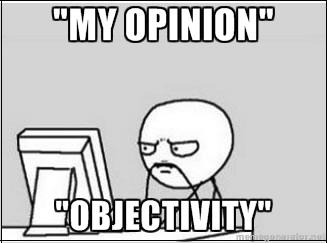
One of the most effective actions you can take to improve your life is developing your ability to think objectively.
Most people think emotionally. Yes, this includes men, who often assume they are rational and impervious to the effects of emotions on their thinking. Men tend to have blind spots in this area just as much as women.
People usually look at their situation, whatever it may be, come up with one possible outcome, and only focus on that outcome happening. Emotions drive the estimate of the outcome occurring.
This human tendency is the reason why the mainstream news media focuses on catchy soundbites rather than objective statistics. Our brains just aren’t wired to naturally think in terms of statistics, and instead we latch on to the stories that are the most memorable.
Case in point: take all the recent media coverage of terrorist attacks, and their appeal to everyone’s innate fear of terrorism. Despite the fact that the odds of dying in a terrorist attack are 1 in 20 MILLION, it’s a natural human tendency to be TERRIBLE at estimating the real risk of low-probability events.
Ok, so what if I’m more scared of terrorism than I should be? Not a big deal right? Well, take a look at how this type of thinking carries over to other areas of your life. Most people don’t think probabilistically in any areas of their life. They look at the world through the lenses of their emotions, never challenging their deeply held beliefs about how the world functions. People overestimate their ability to predict the future, especially about the events in their own life.
This can screw you over in countless ways. In the Leverage Program, we coach guys to stop overestimating the risks associated with actions that can improve their lives, like approaching more girls, quitting a job to become an entrepreneur, or developing a more assertive communication skills. And we also teach people how they tend to underestimate some of the more dangerous risks that people overlook, like texting while driving and eating processed carbohydrates.
Remember how I said people make most of their decisions emotionally? That’s the reason it’s important to be objective about your emotional states.
So a guy who is afraid to approach girls focuses only on the outcome of it going badly, without estimating the likelihood that he will actually get rejected.
Most guys who are bad with women start out from a place of neediness. He needs attention from a woman. He needs to not be rejected. He needs to KNOW an approach will go well before he commits to it.
These are gut-level emotional reactions, and they’re difficult to overcome. But having that kind of emotional response doesn’t have to harm you. As long as you recognize that it’s just a thought and that it’s not actually helping you, you can begin to realize that your subjective emotional experiences are not always indicative of reality.
The more you put yourself in these challenging situations and come out the other side unscathed, the more that snap emotional reaction will lessen. But in the meantime, it’s crucial to remember that this inner dialogue is not helping you, and that if you fuse with those thoughts, they’re only going to prevent you from reaching your goals and improving your relationships.
Thinking probabilistically removes the reckless emotion from your decision-making habits. When you know that you went into a decision making the right call based on all the information you had available at the time, there’s no rational way to second guess yourself afterwards. You don’t regret things you’ve done that went wrong if you came to that decision probabilistically. But you do regret them when you let your emotions decide for you.
This also improves your life by getting you more of the things you want and value. Thinking probabilistically helps you take the right kinds of risk: the ones that have a huge upside of improving your life. Let’s face it, a lot of the things we want are risky. Become more assertive and confident. Making valuable male friendships. Building your career. Telling women how you really feel without being needy.
Socially agile people can be cooperative in difficult situations, use anger effectively when someone blocks them from reaching a goal, or boldly state unpopular opinions in group settings. These are all risk moves.
Do this: Take more risks. Play to win. Be objective. Remember that your thoughts are just thoughts.